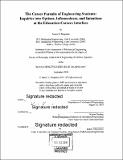| dc.contributor.advisor | Warren Seering. | en_US |
| dc.contributor.author | Magarian, James N | en_US |
| dc.contributor.other | Massachusetts Institute of Technology. Department of Mechanical Engineering. | en_US |
| dc.date.accessioned | 2019-02-05T16:01:40Z | |
| dc.date.available | 2019-02-05T16:01:40Z | |
| dc.date.copyright | 2018 | en_US |
| dc.date.issued | 2018 | en_US |
| dc.identifier.uri | http://hdl.handle.net/1721.1/120257 | |
| dc.description | Thesis: Ph. D. in the field of Engineering Workforce Dynamics, Massachusetts Institute of Technology, Department of Mechanical Engineering, 2018. | en_US |
| dc.description | Cataloged from PDF version of thesis. | en_US |
| dc.description | Includes bibliographical references. | en_US |
| dc.description.abstract | This thesis examines how the career plans of U.S. engineering students shape the composition of the engineering workforce. The health of this workforce - including its demographic diversity and inflow of candidates with key skills - attracts substantial attention from employers, policymakers, and educators. Prior literature has identified patterns of systemic variation in career intentions among students in the engineering educational pipeline, where certain student subsets have exhibited a lower likelihood of pursuing traditionally categorized engineering occupations after engineering school compared to others. Examining these patterns of occupational intentions remains critical, as some of such patterns continue to hinder workforce development goals, including demographic diversification and retention of those with certain skills profiles. We began our investigation by constructing a multivariate occupational sorting model for engineering students that incorporates factors shown in prior studies to be associated with students' occupational outcomes. We empirically validated this model using survey data from a sample of 1,061 senior year engineering students. We present results showing how different occupational outcomes are associated, on average, with different student-specific characteristics. Next, we describe findings from a randomized survey experiment conducted upon the same student sample. Here, we investigated how experimental manipulation of engineering job attributes influences students' preferences for jobs. The experiment allowed us to draw causal inferences about how jobs' attributes interact with students' characteristics to explain variance in job preferences. We discuss the experiment's implications for enhancing candidate-career matching and for mitigating undue attrition from the engineering pipeline. We also present results from a systematic literature review examining the changing careers landscape faced by engineering students. Here, we identified core elements of traditional engineering jobs that endure in contemporary positions, and we characterize a set of increasingly prevalent engineering-related jobs that has arisen. We present a typology of engineering work built upon the review. The typology facilitates categorization of the engineering-relatedness of engineering graduates' diverse careers. We conclude by discussing how increased job market complexity strains engineering schools' ability to prepare students to make well-informed career decisions, and draw upon findings from the survey experiment to suggest ways that educators can remove impediments to ideal student-career matching. | en_US |
| dc.description.statementofresponsibility | by James N. Magarian. | en_US |
| dc.format.extent | 277 pages | en_US |
| dc.language.iso | eng | en_US |
| dc.publisher | Massachusetts Institute of Technology | en_US |
| dc.rights | MIT theses are protected by copyright. They may be viewed, downloaded, or printed from this source but further reproduction or distribution in any format is prohibited without written permission. | en_US |
| dc.rights.uri | http://dspace.mit.edu/handle/1721.1/7582 | en_US |
| dc.subject | Mechanical Engineering. | en_US |
| dc.title | The career pursuits of engineering students : inquiries into options, informedness, and intentions at the education-careers interface | en_US |
| dc.type | Thesis | en_US |
| dc.description.degree | Ph. D. in the field of Engineering Workforce Dynamics | en_US |
| dc.contributor.department | Massachusetts Institute of Technology. Department of Mechanical Engineering | |
| dc.identifier.oclc | 1083204907 | en_US |
